Gender in niGeria report 2012 - Economic Commission for Africa
Gender in niGeria report 2012 - Economic Commission for Africa
Gender in niGeria report 2012 - Economic Commission for Africa
You also want an ePaper? Increase the reach of your titles
YUMPU automatically turns print PDFs into web optimized ePapers that Google loves.
<strong>Gender</strong> <strong>in</strong> Nigeria Report <strong>2012</strong>: Improv<strong>in</strong>g the Lives of Girls and Women <strong>in</strong> Nigeria 21<br />
largest disparity: here, only 4% of women own land, a rate 13 times lower than that of<br />
men. Land ownership <strong>in</strong> urban areas (table 11) shows a similar pattern; men are five<br />
times more likely to own land than women. Lack of land ownership <strong>in</strong> urban areas has<br />
implications not only <strong>for</strong> shelter, security and access to services but also <strong>for</strong> wealth<br />
creation, because many urban micro-enterprises use homes as a stag<strong>in</strong>g post.<br />
4.4 Women <strong>in</strong> enterprise<br />
Women run only 20% of enterprises <strong>in</strong> the <strong>for</strong>mal sector (World Bank, 2009: 92).<br />
23% of these enterprises are <strong>in</strong> the retail sector. Women make up 37% of the total work<br />
<strong>for</strong>ce <strong>in</strong> the garment <strong>in</strong>dustry. They are very poorly represented <strong>in</strong> the wood, metals,<br />
chemicals, construction, and transport <strong>in</strong>dustries. In general the <strong>report</strong> f<strong>in</strong>ds that more<br />
women are <strong>in</strong> the <strong>for</strong>mal sector <strong>in</strong> the South than <strong>in</strong> the North, and that the rate of<br />
female entrepreneurship <strong>in</strong> the micro sector is higher <strong>in</strong> the more <strong>in</strong>dustrialised States of<br />
the South (36%) than <strong>in</strong> the North (23%). This suggests that many of the opportunities<br />
<strong>for</strong> micro-enterprises are l<strong>in</strong>ked to the <strong>for</strong>mal manufactur<strong>in</strong>g sector.<br />
Limited opportunities <strong>for</strong> employment and a rather small medium-scale<br />
enterprise sector has meant that micro or <strong>in</strong><strong>for</strong>mal enterprise has become<br />
a default strategy <strong>for</strong> many Nigerians. A majority of the 43% of women cited<br />
as economically <strong>in</strong>active make their liv<strong>in</strong>g through micro-enterprises. 16 The recently<br />
completed “2010 Access to F<strong>in</strong>ancial Services <strong>in</strong> Nigeria” shows that own<strong>in</strong>g a bus<strong>in</strong>ess<br />
has become the ma<strong>in</strong> source of <strong>in</strong>come <strong>for</strong> 19.5 million adult Nigerians (EFInA, 2011).<br />
23% of the respondents <strong>in</strong> this survey <strong>in</strong>dicated “own bus<strong>in</strong>ess” as the ma<strong>in</strong> source<br />
of <strong>in</strong>come, ahead of farm<strong>in</strong>g (18.7%) and wage employment (12.6%). The importance<br />
of micro-enterprises as the ma<strong>in</strong> source of <strong>in</strong>come makes it a strategic area <strong>for</strong> the<br />
empowerment of women. Recent work (World Bank, 2009: 92) shows that women <strong>in</strong><br />
the micro-enterprise sector tend to be better educated, and that more of them <strong>report</strong><br />
vocational and graduate education compared to men. There are suggestions that<br />
barriers to both <strong>for</strong>mal employment and opportunities <strong>for</strong> <strong>for</strong>mal enterprise may <strong>in</strong> part<br />
expla<strong>in</strong> this (Kwakwaet al., 2008). Ethnographic work suggests that women play an<br />
active role <strong>in</strong> market associations (Porter et al., 2010).<br />
4.5 Access to f<strong>in</strong>ance and fairer<br />
taxation<br />
The importance of micro-enterprise <strong>for</strong> women makes access to bus<strong>in</strong>ess<br />
f<strong>in</strong>ance a key determ<strong>in</strong>ant of their ability to make a liv<strong>in</strong>g; yet about 65% of<br />
Nigerians have no bank account (Bamsile, 2006) and rely on <strong>in</strong><strong>for</strong>mal and other<br />
<strong>for</strong>mal microf<strong>in</strong>ance <strong>in</strong>stitutions <strong>for</strong> access to capital. For rural women, opportunities<br />
<strong>for</strong> non-farm, non-agricultural opportunities are constra<strong>in</strong>ed by their lack of access to<br />
capital (Izugbara, 2008). Women ventur<strong>in</strong>g <strong>in</strong>to manufactur<strong>in</strong>g are more likely to rely on<br />
family and friends <strong>for</strong> f<strong>in</strong>ance, partly because they lack collateral security (Madichie and<br />
Nkamnebe, 2010), but also because they are more likely than men to be deterred from<br />
apply<strong>in</strong>g <strong>for</strong> <strong>for</strong>mal loans by the complexity of the application process. (35% of women<br />
said they were deterred, 26% of men). 17<br />
Women without collateral security struggle to obta<strong>in</strong> f<strong>in</strong>ance <strong>for</strong> off-farm<br />
activities. Data from the NBS (2009) show that men are twice as likely to secure<br />
f<strong>in</strong>ance compared to women. In 2007, <strong>for</strong> example, some 20,098 men accessed loans<br />
compared to 8,550 women. About 64% of the N528,251 that was loaned went to<br />
male applicants. A recent World Bank <strong>report</strong> on the “Investment Climate <strong>in</strong> Nigeria” 18<br />
16 See Kwakwa et al. (2008).<br />
17 World Bank (2010: 96).<br />
18 World Bank (2009).

















